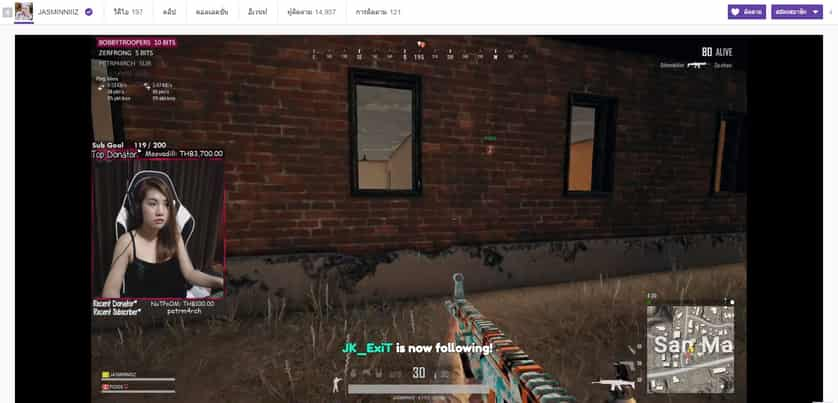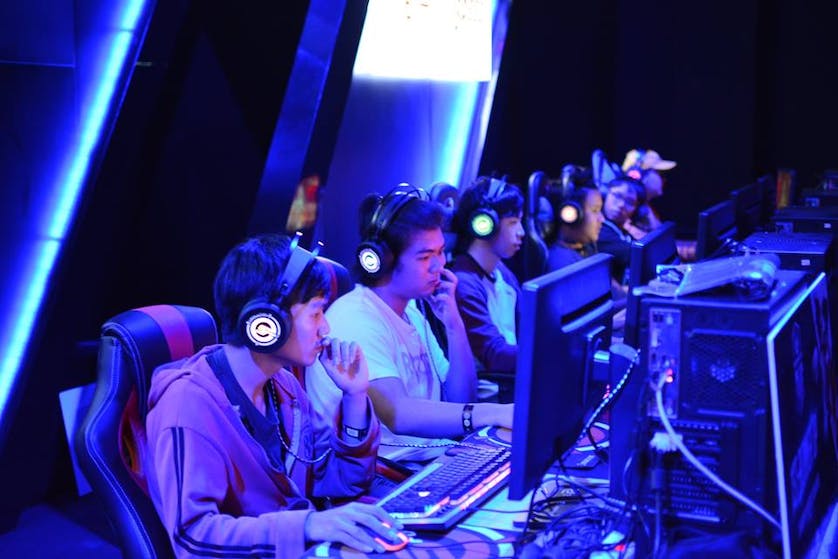I found myself sitting in a nearly all-male audience in a dim hall bathed in a glow of LED lights shining from a big bright stage. Facing one another were players fighting to win the northern round of the ESport Thailand Championship. My eyes, along with the buzzing crowd’s, were fixed on a huge screen at the centre of the stage displaying a virtual football stadium. It was a FIFA Online national tournament and the winner could take home a whopping two million baht. The commentators were rapping their words in speedy excitement and when the ball hit the goal, the stadium thundered with the roar of the virtual crowds. The actual human audience? Silence. The tension of the players on the stage was palpable and you could almost hear the crowd hold its collective breath in excitement. The (virtual) footballers in the leading team, many of whom had faces and names matching actual pro sportsmen, were bending like Beckham and doing all manner of clever foot play, all with their nimble fingertips; the wrong press of the button leading to potential serious injury. I had to pinch myself at the disconnect. It was surreal. I felt just like watching a game of football on TV at home…except no one was sweating.
Dota 2’s annual world championship tournament, The International 2018
eSports may sound like an oxymoron, but the industry is growing exponentially worldwide, challenging those in the sports world who deride its legitimacy. According to Newzoo, eSports’s global revenues are expected to reach 906 million US dollars this year with a year on year growth of 38% and a projection that it will reach 1.65 billion US dollar in three years. The figure is still small compared to the whole sporting industry (139 billion US dollars) and gaming industry (108 billion US dollars), but both are eyeing this upstart industry with interest.
I play video games. But that’s just like saying I drink wine. There are those who consume for pleasure, those who know a thing or two, and those who make a career out of it. Gaming is a vast world and the games I play have little overlap with eSports. A quick recap for those who are new to the term. eSports is a competitive, multiplayer video game competition that is organised in a format such as leagues or tournaments. Widely known games such as League of Legions, a multiplayer online battle arena (MOBA) game, attracts over 80 million players a month. Dota 2 is another game among this category which has its own gigantic world tournament, The International. This year the competition offered over 25 million US dollars in the prize pool, the largest figure ever seen in the eSports world, with the winning team receiving over 10 million US dollars. The world renowned football club FC Barcelona has just entered the arena of Pro Evolution Soccer 2018 (PES2018) becoming the first iconic football club competing in eSports while Manchester City is the first Premier League Club to have an eSports brand sponsor their FIFA Online team.
I have attempted to play these eSports games so many times but it never lasts long. Why? Because I suck at it and after losing for ten times straight, I just get bored as eSports games run in a loop – enter the arena, fight for your life, win/loose, back to the start. It is quite enjoyable playing with friends, though, as we can talk through the strategy. It is vital to know your role in the game and have a thorough understanding of your hero’s skill sets, their strengths and weaknesses. Nimble reflexes is critical to how good of a player you are as there is only a split second to pick a response and press a button. Other skills required are strategic thinking, lightening reaction and good fitness.
By definition, sports is “a game, competition, or activity needing physical effort and skill that is played or done according to rules, for enjoyment and/or as a job.” In the 1990s, the term mind sport arose, peddled by players of games such as chess and bridge, gaining recognition from the International Olympic Committee, while the SportAccord, the international sports federation association, accepts three other games including checkers, Go and xiangqi. Then in 2008, the World Mind Sports Games was inaugurated. The event is held around two months after the Summer Olympics. So, a newbie like eSport might have a long way to go, but it is on course for legitimacy. And although eSports was only featured as a demonstration sport at the 2018 Asian Games 2018, the Olympic Council of Asia has announced that it will become a medal event at the 2022 games.

The trend has caught on fast here in Thailand with Buriram United Football Club recently becoming the first Thai football club to form an eSports team. The Sports Authority of Thailand has officially acknowledged eSports, in 2017 giving it the authority to set up an association according to the Sports Authority of Thailand Act 2015. DEPA has revealed that Thailand’s gaming market in 2016 was over 16 billion baht while the Thailand eSports Federation (TESF) has projected this year’s number at 30 billion baht with a huge push from mobile gaming companies especially the Arena of Valor (ROV), the fastest growing eSports in Thailand. The growth of the industry has attracted significant investment, creating countless career opportunities for many. Universities are launching related courses to feed human resources to the market. Bangkok University has paired up with Garena and put the Games and Interactive Media in their curriculum.
“I started it off as a crowdfunding platform for eSports,” said Tanachod ‘Tul’ Kietbunjong, a CEO and co-founder of Kochii (Thailand) which is now a coaching platform for aspiring players. “To get people to know my platform, I have to organise events. At first it started with a small local event in Chiang Mai with an audience of about a hundred people, but the more frequently I held them, the more people requested me to become a tournament organiser,” said Tul who has run large scale offline tournaments for Pantip and Central. “Esports is still a small community in Thailand as many people think that it’s nonsense,” said Tul as he explained that among the estimated 20 million gamers in Thailand only a few thousands are professional players with only a handful of people actually making it to the international stage. These professional players’ revenue ranged between 15,000 to 20,000 baht a month, according to the TESF. The top ranked player is Anucha Jirawong, known as Jabz, a 19 year old Dota 2 player who has been recruited in FNATIC, one of most recognised eSports teams in the world, and has earned over 7 million baht from competitions. Mickie, Pongphop Rattanasangchod, 24, an Overwatch player who is playing for The Dallas Fuel, is another Thai player who has gained a spot on the international stage wining over a million baht from nine tournaments.

A Chiang Mai based streamer JAZMINNIIIZ
Livestreaming is huge in the gaming community with Twitch, a user-generated content platform dominating the market. In 2017, Twitch hosted over two million broadcasters who play the games and livestream themselves, with over 15 million unique daily visitors to the platform. Aside from broadcasting a tournament, Twitch is driving the phenomenon of gaming broadcasts connecting players and eSports enthusiasts. “It started with my friend asking me to stream playing PUBG . At first I livestreamed on Facebook but then I got feedback that the quality wasn’t quite good so my friend suggest I stream on Twitch. It was only among friends at first but as I was quite addicted, playing 20 hours a day, I started to get traffic from other people,” said Natthida Panyakaew, a fulltime streamer under the name JAZMINNIIIZ. She who has started livestreaming last year and has already generated around a million baht from Twitch.
The key function of Twitch is the interactive chat right next to the streaming screen where viewer can respondse to the game in real time. How much interactive the streaming is totally depends on the streamer’s style. There are players who just keeps to themselves, concentrating on the game while viewers can focus oin learning that player’s tactics, and there are players who are quite chatty with the viewers. “There are pro-players who stream to present their tactics and there are average players like me who stream for entertainment,” said Natthida whose channel has over 14,000 followers with over 530,000 views. With a chatroom, a simple one-way broadcast is turned into a two-way communication, and therefore creating a community based on streamer characteristics where viewers can choose a community that suits their preferences.
Unlike Youtube, Twitch provides a range of ways for broadcasters to earn money from the viewers mainly through subscription, donations and bids. “Now I don’t play as crazy much but I follow a schedule, playing from 9am until 4pm in the daytime and 9pm to 11pm at night,” the 24 year old fulltime streamer said of her nine hours’ daily streaming schedule a day. Other than support from the viewers, streamers can also partner with brands which could be gaming gear makers for of gaming gear like specially designed chairs and, eyewear for players or tech products, etcand a number of things. PC specs along with other hardware are on public displaydisplayed on the streamer’s page, as people tend to ask which gear streamers use, Natthida explained.

Photo: Pantip Plaza Chiang Mai
“Unlike traditional sports – football, tennis, basketball – each of eSports’ game has an ownership,” said Tul pointing out that there are commercial benefits involved. He gave the example of the previous Asian Games where four out of six games in the eSports demonstration had shares in Tencent, athe Chinese tech giant who owns WeChat.
“There are two streams of eSports here in Thailand; those who play under the official Thailand E-Sports Federation which tries to be a part of the overall picture, with players receiving medals from military officials after winning the game, things like that. And there are the business people whose main focus is on building a famous team to compete on the international stage,” said Tul sharing his view on the industry. The debate over whether eSports is a sport or not can go on forever. But as it has now fullly emerged onto the world state, with a whole new industry sprouting along with it, maybe it does not really matter after all. Its legitimacy, whether a sport or not, has been established. The fight for a place in the legendary international sporting arena isn’t about legitimacy, but marketing and benefits. Now that geeky, out-of-shape nerds have the potential to become sporting super stars, I for one, may head back home and give Dota 2 another go.



